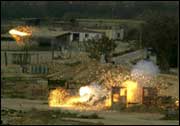Home > US Edition > The Gulf War II > Reuters > Report
US forces launch attack in central
Baghdad; described as just a raid
April 07, 2003 18:59 IST
The aim of the attack on central Baghdad on Monday morning was not to take ground but to send a message to the Iraqi army and others opposed to the US action, a US military spokesman said.
"This is an armoured raid on the city," Captain Frank Thorp said at the US military headquarters in Qatar.

The US wanted to tell the people of Baghdad that its forces were in a position to dictate terms and could enter the Iraqi capital at will.
"We're expecting to see the Republican Guards and the special Republican Guards put up a fight," he said, referring to President Saddam Hussein's elite fighting units.
"We should stay calm. There's a lot of tough battles ahead," he said.
Launching an attack on central Baghdad on Monday morning, US troops took control of President Saddam Hussein's main presidential palace in Baghdad and entered a second, the US military claimed.
There were also reports that Hussein's cousin and the man in charge of defending southern Iraq Ali Hassan al-Majid, sometimes referred to as 'Chemical Ali', may have died in a missile attack delivering a stunning blow to the Iraqi president.
"We have seized the main presidential palace in downtown Baghdad. There are two palaces down there and we are in both of them," Lieutenant Colonel Pete Bayer told Reuters reporter Luke Baker.
Bayer said 65 US tanks and 40 Bradley fighting vehicles took part in Monday's operation, which took the war to oust Saddam to the centre of the Iraqi capital.
"The operation has been highly successful so far. We are trying to gauge what his (Saddam's) response will be," said Bayer, operations officer in the 3rd US infantry division.
He said there were no reports of any casualties so far among US forces, which had begun probing the northwest districts of the Iraqi capital.
Another correspondent Samia Nakhoul said. "They are right in the heart of the city."
Nakhoul said palm trees on the edge of the river Tigris had been set ablaze in the fighting. Iraqi forces also set ablaze a nearby oil trench in an apparent effort to confuse US forces.
US planes continued to bombard the Iraqi capital. A top US general said that US forces were present all around Baghdad in significant numbers.
Iraq, in an admission that the invasion had reached the doorstep of the capital, said it had fired five missiles at US-led forces on the outskirts of the city.
An Iraqi state television announcer read out a statement urging soldiers to report for duty and to join up with whatever unit they could.
US troops said they had taken control of Karbala, 110km southeast of Baghdad, after fierce battles with Iraqi paramilitaries threatening US supply lines.
"The fidayeen (suicide squads) have lost a powerbase," Lt Col Chris Holden of the 101st Airborne Division told Reuters, referring to Saddam's fiercely loyal black-clad supporters.
"All roads here lead to Baghdad and now we can drive those roads. They are secure, the threat of ambush is very minimal."
Meanwhile, in the south, British forces are reported to have entered Basra. The BBC reported that Ali Hassan al-Majid, derisively called 'Chemical Ali' for ordering a poison gas attack on Kurds in northern Iraq, may have died in a missile attack in Basra.
Majid, Hussein's cousin, was in charge of the defence of southern Iraq.
The death toll of civilians caught in the cross-fire of the war was reported to be climbing into the hundreds as fierce close-quarters fighting raged in cities across Iraq.
US President George W Bush, who launched the war on March 20 saying he wanted to eliminate the threat of chemical or biological weapons falling into terrorist hands, was due to meet key ally British Prime Minister Tony Blair later on Monday to discuss a possible United Nations role in post-Saddam Iraq.
US officials have ruled out a key political mission for the UN, saying Washington and its allies earned that right by giving 'life and blood' on the battlefield. Blair and other European leaders want the UN Security Council to endorse the post-war process.
© Copyright 2003 Reuters Limited. All rights reserved. Republication or redistribution of Reuters content, including by framing or similar means, is expressly prohibited without the prior written consent of Reuters. Reuters shall not be liable for any errors or delays in the content, or for any actions taken in reliance thereon.
|